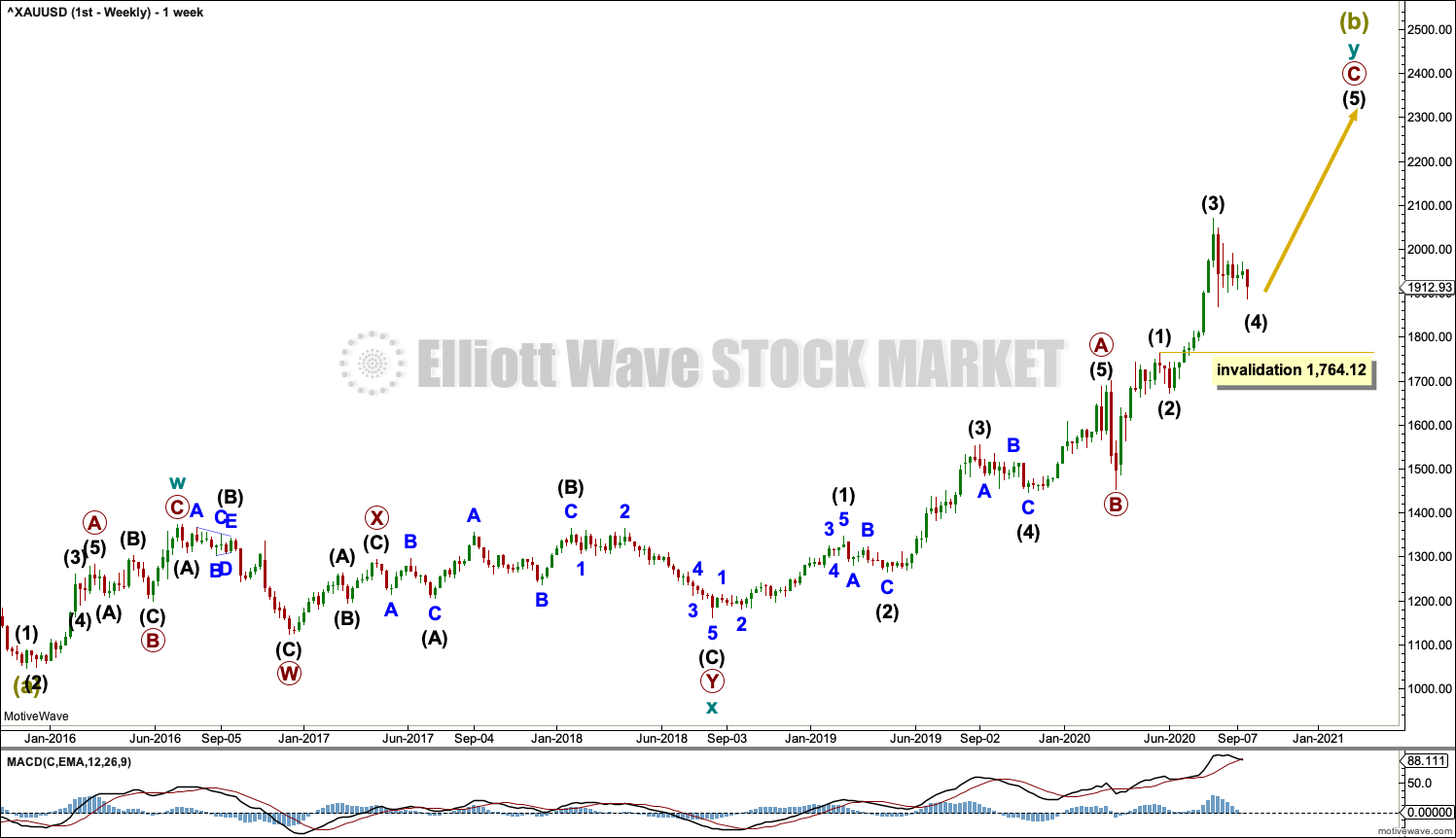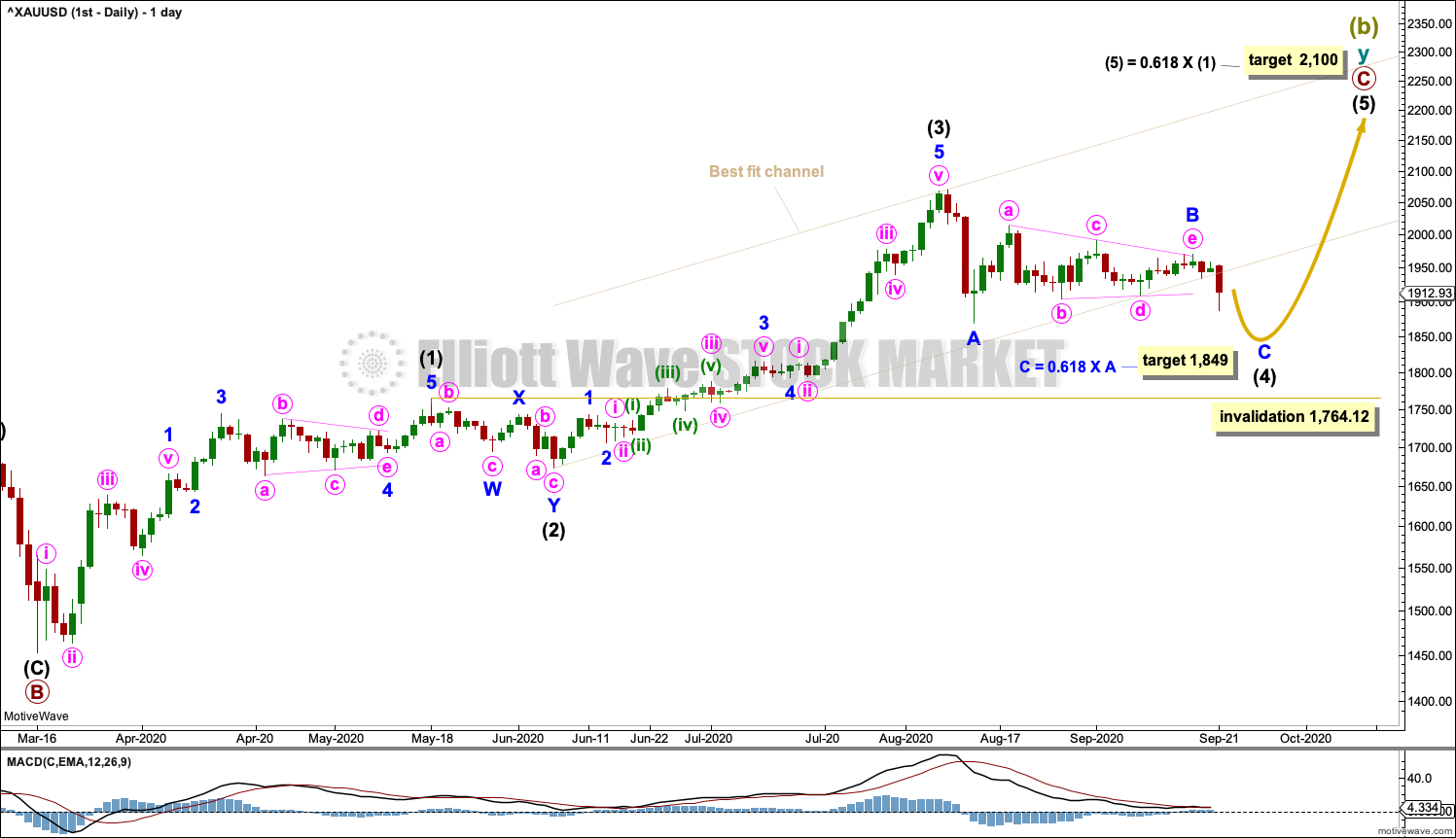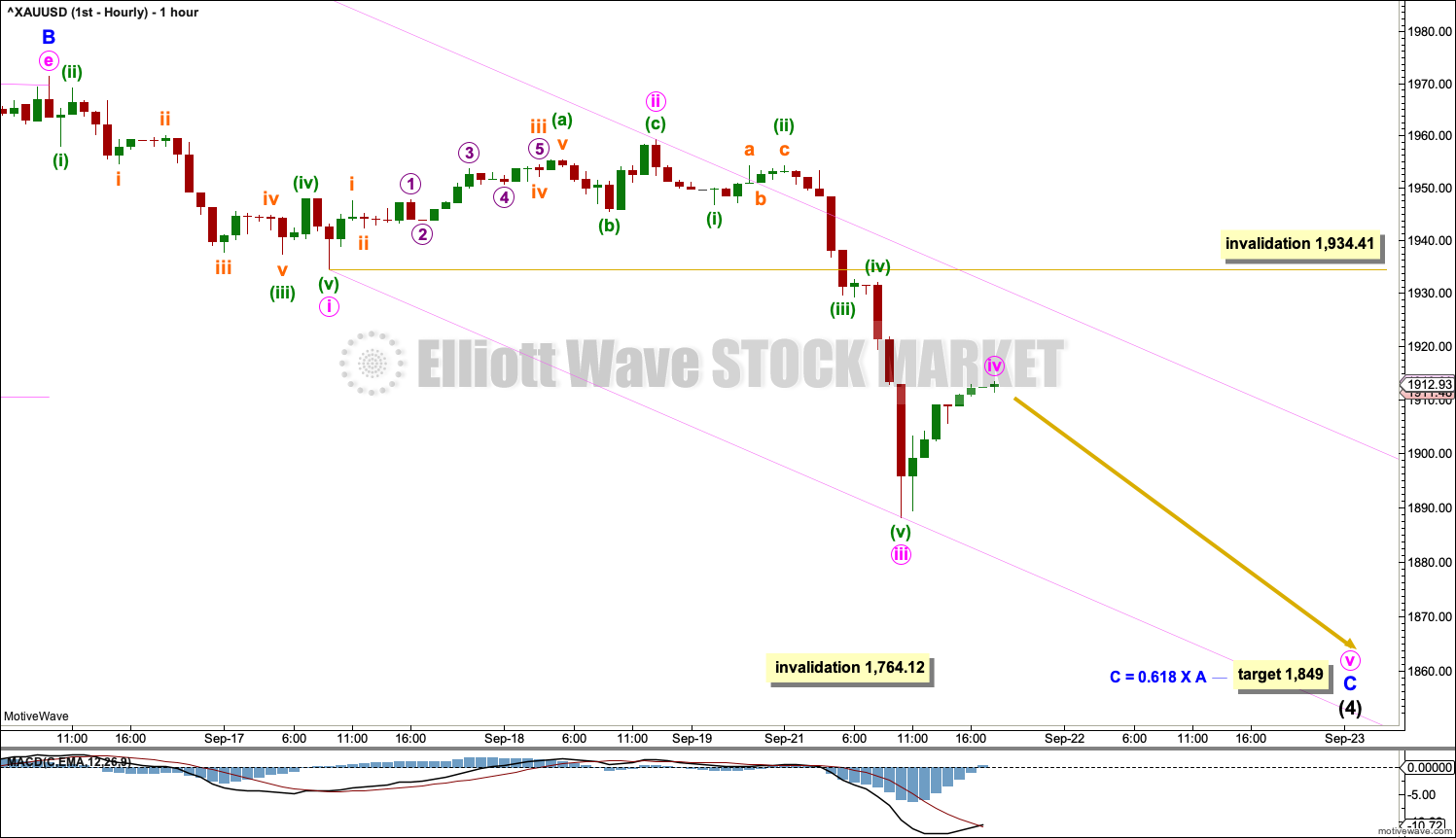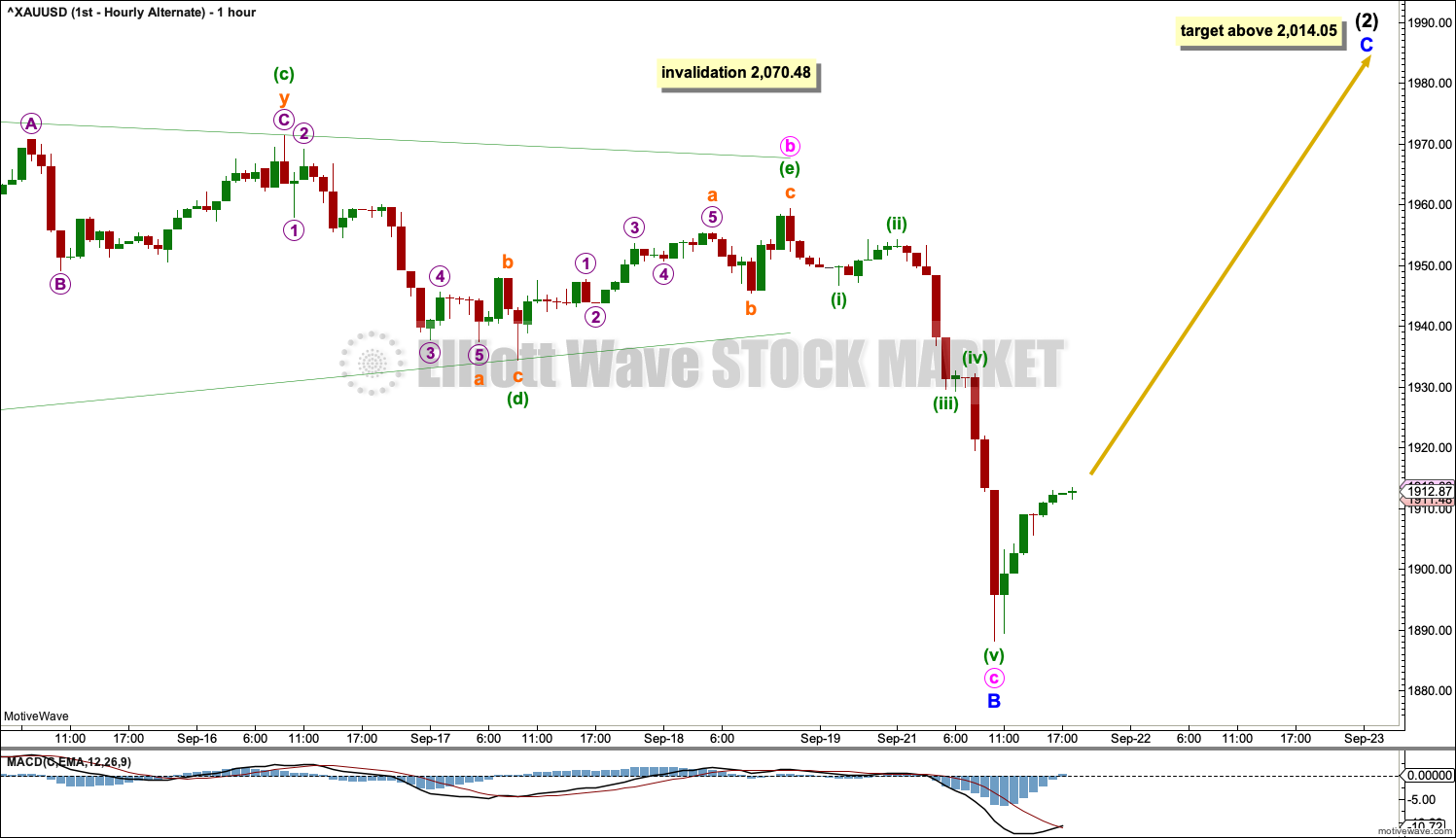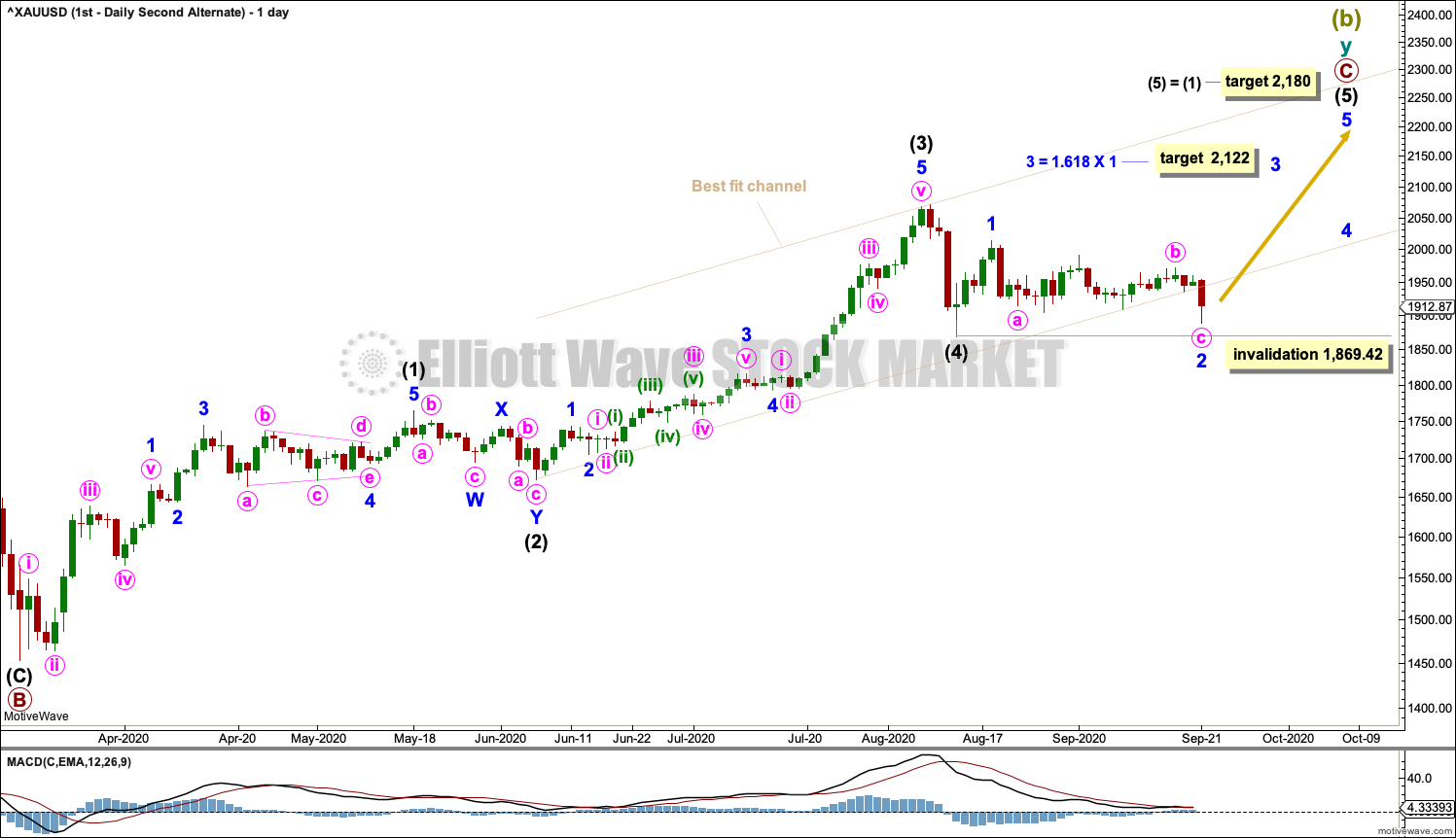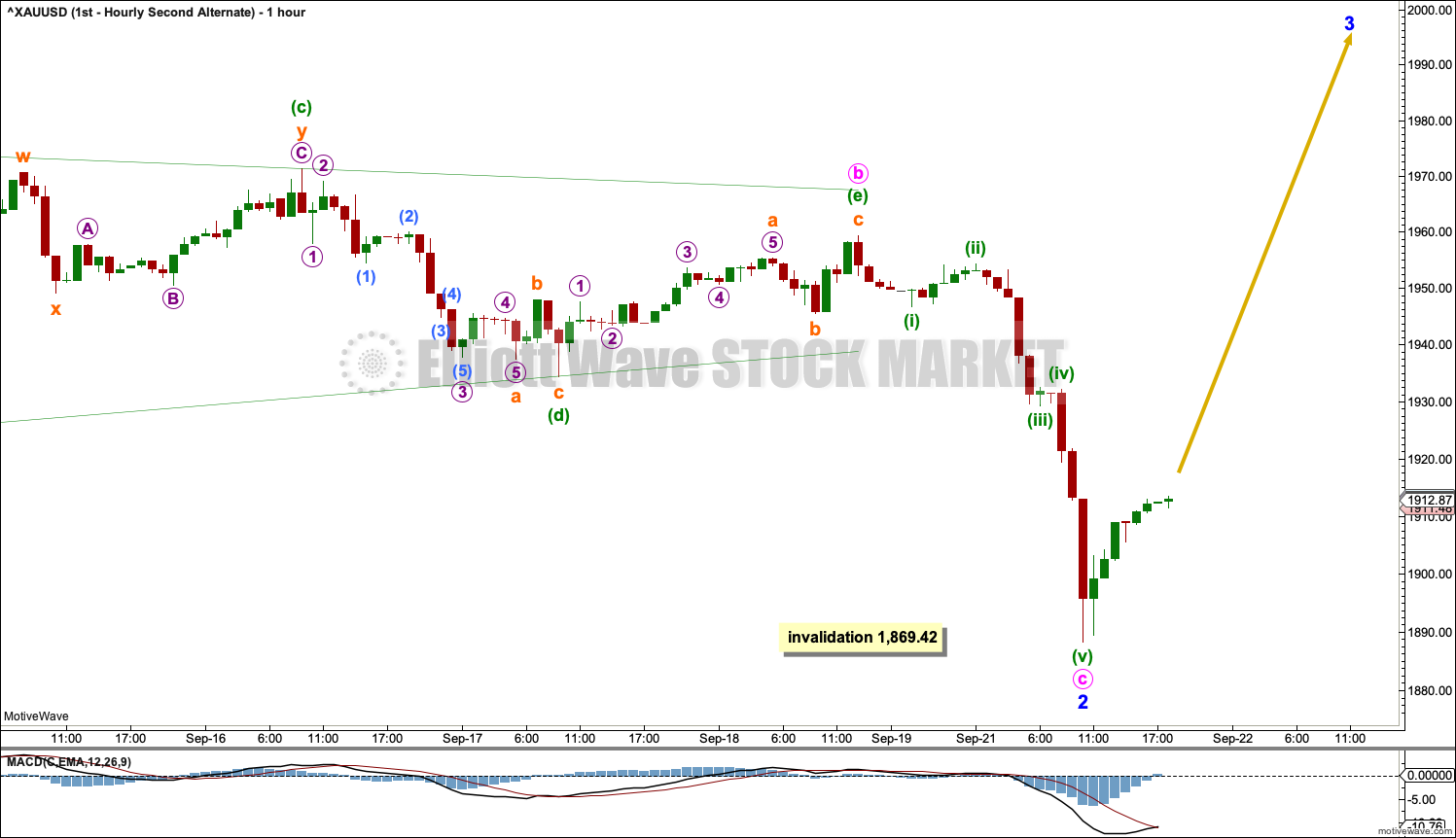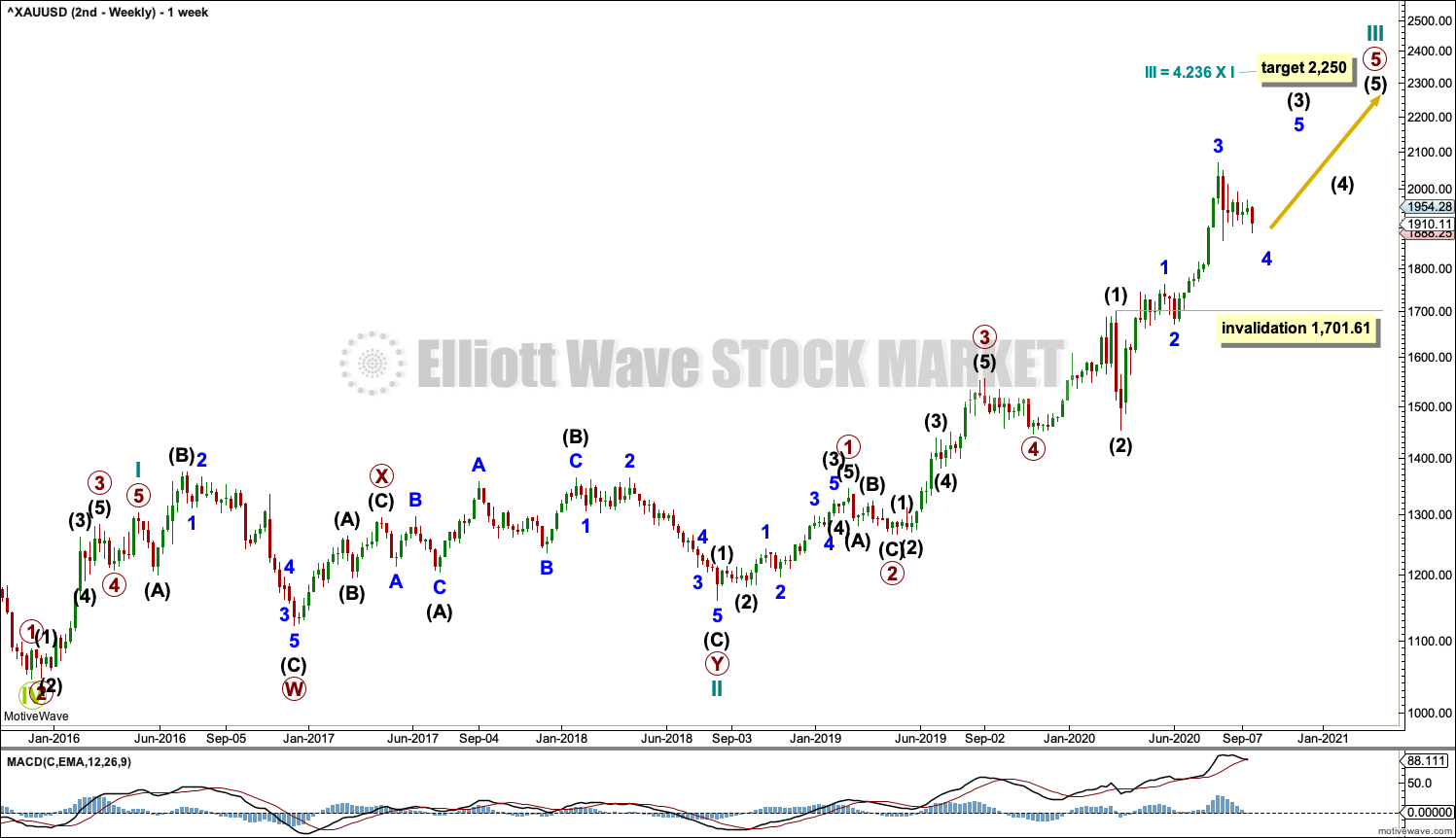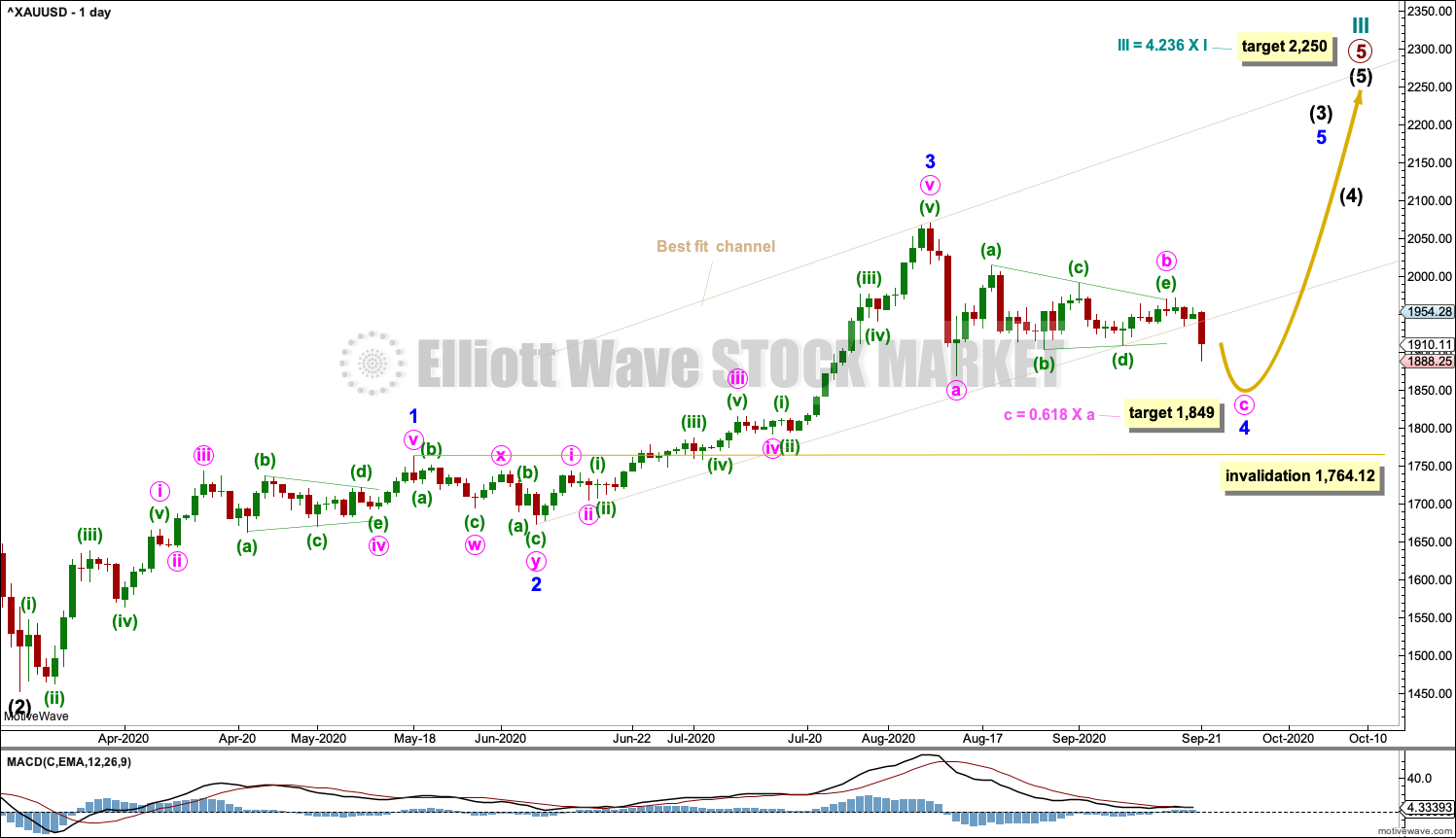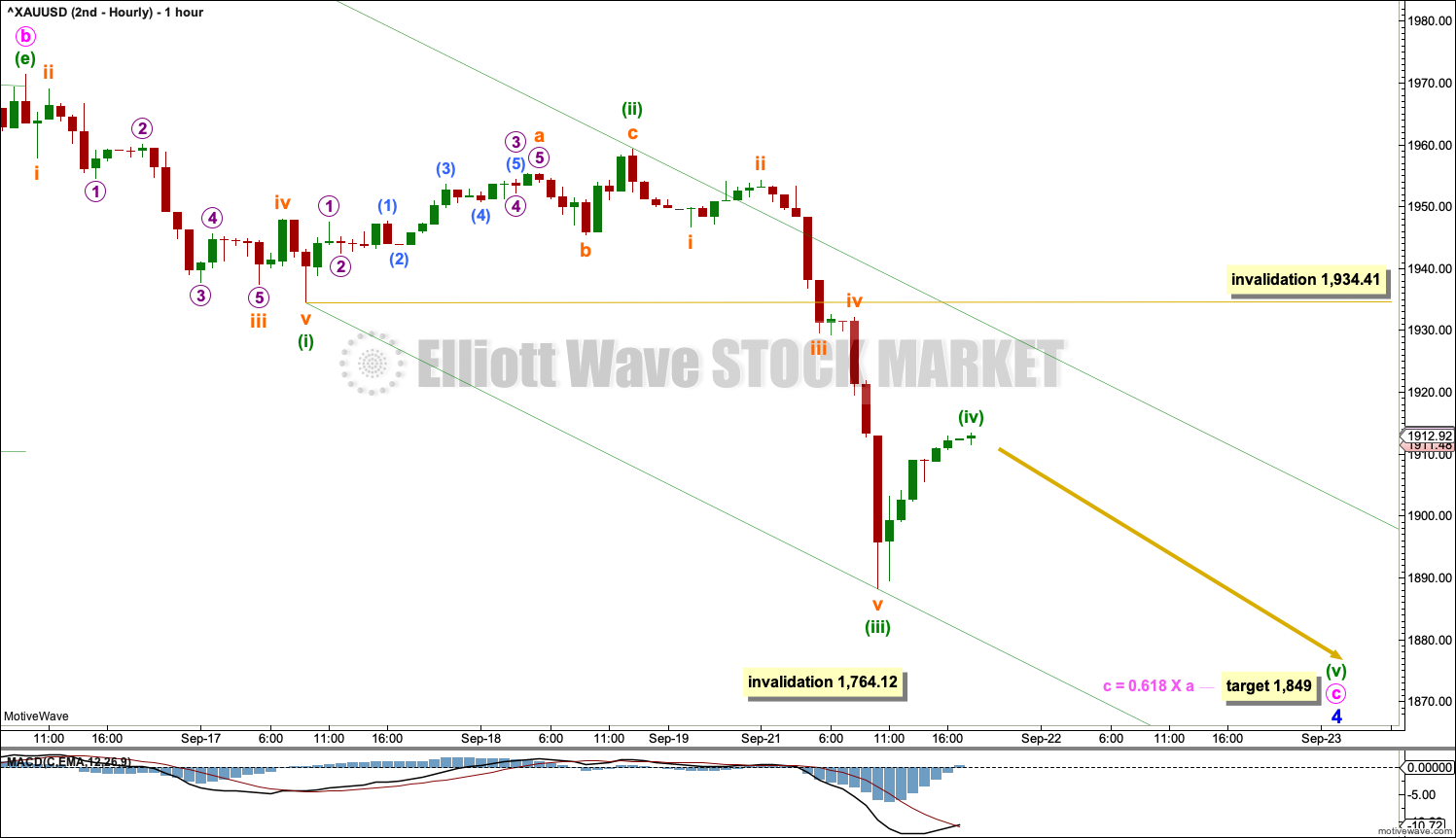GOLD: Elliott Wave and Technical Analysis | Charts – September 21, 2020
Today price has broken out of the triangle to the downside.
Summary: A target calculated from the classic symmetrical triangle pattern is at 1,712. The first Elliott wave count has a target at 1,849 and does not expect a new low below 1,764.12.
A new low below 1,764.12 at any time frame would invalidate the first daily chart and add confidence in an alternate daily chart. At that stage, a sustainable high would be in place and a new downwards trend to last months may be underway.
Grand SuperCycle analysis is here.
Last analysis of monthly charts is here with video here.
FIRST ELLIOTT WAVE COUNT
WEEKLY CHART
The bigger picture for this first Elliott wave count sees Gold as still within a bear market, in a three steps back pattern that is labelled Grand Super Cycle wave IV on monthly charts. The common range for Super Cycle wave (b) is from 1 to 1.38 times the length of Super cycle wave (a), giving a range from 1,920.18 to 2,252.27. The target would see Super Cycle wave (b) end within this most common range.
Super Cycle wave (b) within Grand Super Cycle wave IV may be an incomplete double zigzag. When Super Cycle wave (b) may be complete, then this wave count expects Super Cycle wave (c) to begin and to move price below the end of Super Cycle wave (a) at 1,046.27.
The first zigzag in the double is labelled cycle wave w. The double is joined by a three in the opposite direction, a combination labelled cycle wave x. The second zigzag in the double is labelled cycle wave y.
The purpose of the second zigzag in a double is to deepen the correction. Cycle wave y has achieved this purpose.
Primary wave C within cycle wave y may be subdividing as an impulse. Intermediate waves (1) through to (4) within primary wave C may be complete. If it continues any lower, then intermediate wave (4) may not move into intermediate wave (1) price territory below 1,764.12.
We should always assume the trend remains the same until proven otherwise. At this stage, Gold is in a bull market.
DAILY CHART
The daily chart shows detail of primary wave C as an incomplete impulse.
Intermediate waves (1) through to (4) within primary wave C may be complete. Intermediate wave (4) may be a complete triangle.
The channel is drawn as a best fit. Today the lower edge is breached by downwards movement, suggesting a trend change. The first alternate wave count below should be now more seriously considered.
Intermediate wave (2) was a shallow double zigzag, lasting 15 sessions. Intermediate wave (4) may be an incomplete zigzag. Minor wave B within intermediate wave (4) may have been a triangle. Intermediate wave (4) may not move into intermediate wave (1) price territory below 1,764.12.
HOURLY CHART
Intermediate wave (4) may be an incomplete zigzag. Minor wave B within the zigzag may have completed as a triangle.
Minor wave C may only subdivide as a five wave motive structure, most likely an impulse. Minute wave iv within minor wave C may not move into minute wave i price territory above 1,934.41.
ALTERNATE DAILY CHART
It is also possible that a Super Cycle degree trend change has occurred at the last high. However, we should always assume the trend remains the same until proven otherwise. Assume the upwards trend remains in place and the main wave count is correct until the upwards trend is invalidated with a new low below 1,764.12. At that stage, this would become the main wave count.
Intermediate wave (2) may be an incomplete zigzag. Minor wave B within it may be an incomplete zigzag, with minute wave b a complete triangle. Minor wave C would be likely to move at least slightly above the end of minor wave A at 2,014.05 to avoid a truncation. Intermediate wave (2) may not move beyond the start of intermediate wave (1) above 2,070.48.
Super Cycle wave (c) would be likely to make at least a slight new low below the end of Super Cycle wave (a) at 1,046.27 to avoid a truncation. If price provides confidence in this wave count with a new low below 1,764.12, then a target would be calculated for Super Cycle wave (c) to end.
ALTERNATE HOURLY CHART
Minor wave B may now be a complete zigzag.
Minor wave C may now begin. Minor wave C would be likely for this wave count to make at least a slight new high above the end of minor wave A at 2,014.05 to avoid a truncation.
Intermediate wave (2) may not move beyond the start of intermediate wave (1) above 2,070.48.
SECOND ALTERNATE DAILY CHART
Following on from the first wave count, this second alternate wave count labels primary wave C as incomplete with intermediate wave (4) within it complete as a quick zigzag.
Intermediate wave (5) may have begun.
Minor waves 1 and 2 within intermediate wave (5) may be complete. If it continues any lower, then minor wave 2 may not move beyond the start of minor wave 1 below 1,869.42.
Minor wave 2 is much longer in duration than intermediate wave (4) one degree higher. This disproportion gives this wave count the wrong look, reducing its probability.
SECOND ALTERNATE HOURLY CHART
Minor wave 2 fits well as a zigzag. It may be complete.
This alternate wave count now expects to see an increase in upwards momentum for a third wave.
SECOND ELLIOTT WAVE COUNT
WEEKLY CHART
This wave count sees the the bear market complete at the last major low for Gold on 3 December 2015.
If Gold is in a new bull market, then it should begin with a five wave structure upwards on the weekly chart.
Cycle wave I fits as a five wave impulse with reasonably proportionate corrections for primary waves 2 and 4.
Cycle wave II fits as a double flat. However, within the first flat correction labelled primary wave W, this wave count needs to ignore what looks like an obvious triangle from July to September 2016 (this can be seen labelled as a triangle on the first wave count above). This movement must be labelled as a series of overlapping first and second waves. Ignoring this triangle reduces the probability of this wave count in Elliott wave terms.
Cycle wave III may be incomplete. Cycle wave IV may not move into cycle wave I price territory below 1,303.51.
DAILY CHART
Cycle wave III may be continuing higher. The daily chart focusses on primary wave 5 within cycle wave III.
Minor wave 4 may be an incomplete zigzag. Minute wave b within the zigzag may be a complete triangle.
Minor wave 4 may not move into minor wave 1 price territory below 1,764.12.
HOURLY CHART
Minute waves a and b within the zigzag of minor wave 4 may be complete.
Minute wave c may only subdivide as a five wave structure. It may be an almost complete impulse. Minuette wave (iv) within minute wave c may not move into minuette wave (i) price territory above 1,934.41.
TECHNICAL ANALYSIS
WEEKLY CHART
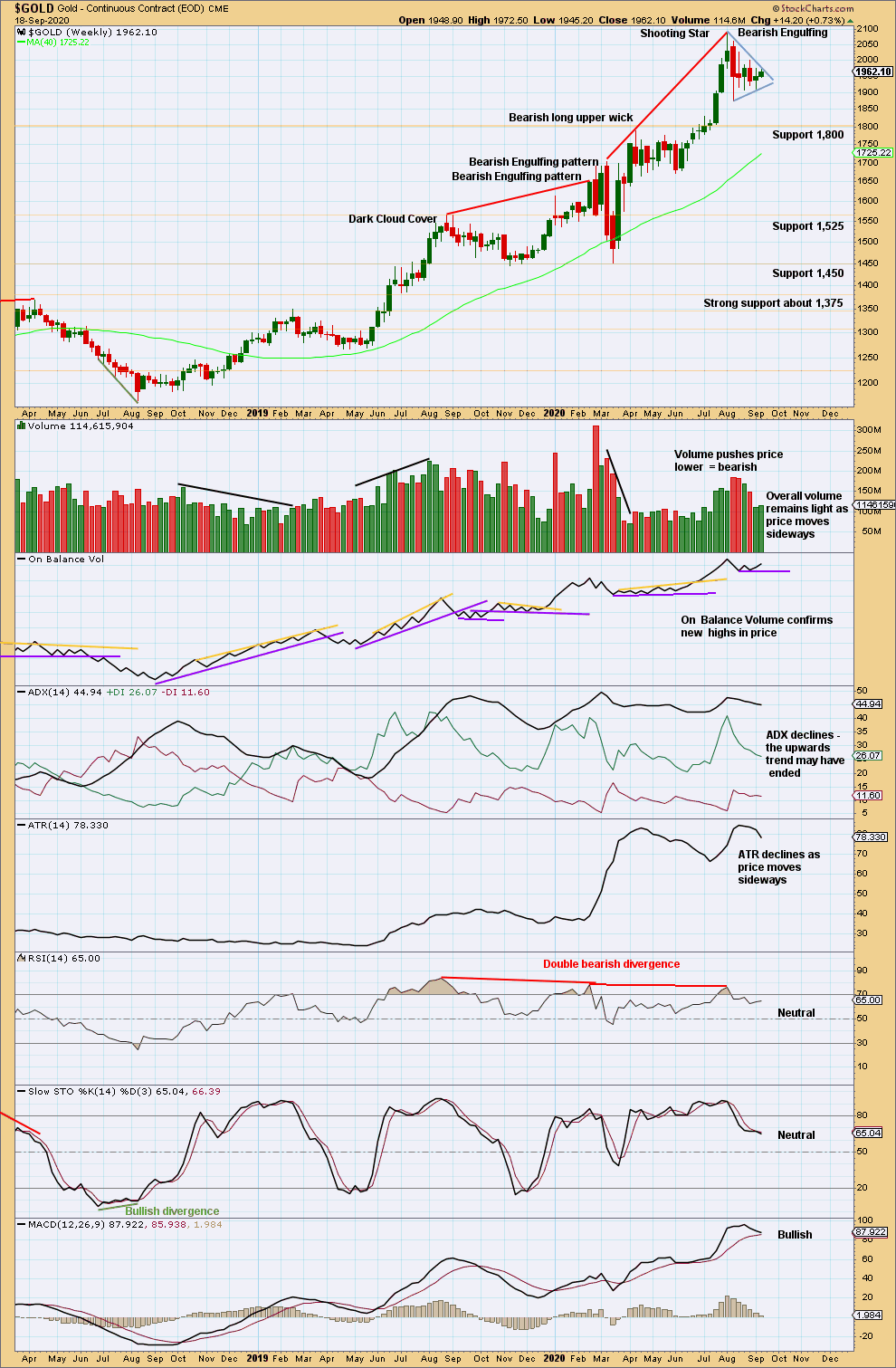
Click chart to enlarge. Chart courtesy of StockCharts.com.
The upwards trend reached very extreme and RSI reached overbought. A Shooting Star and a Bearish Engulfing candlestick pattern appear at the high. Given extreme conditions, these bearish reversal patterns should be given weight; this would support the alternate daily chart. However, it is still possible that further highs may be made before a more time consuming pullback or a 180° trend change may occur.
So far sideways movement of the last 5 weeks has brought RSI down from extreme, but not by much. ADX remains high. If the upwards trend continues here, it may be limited.
DAILY CHART
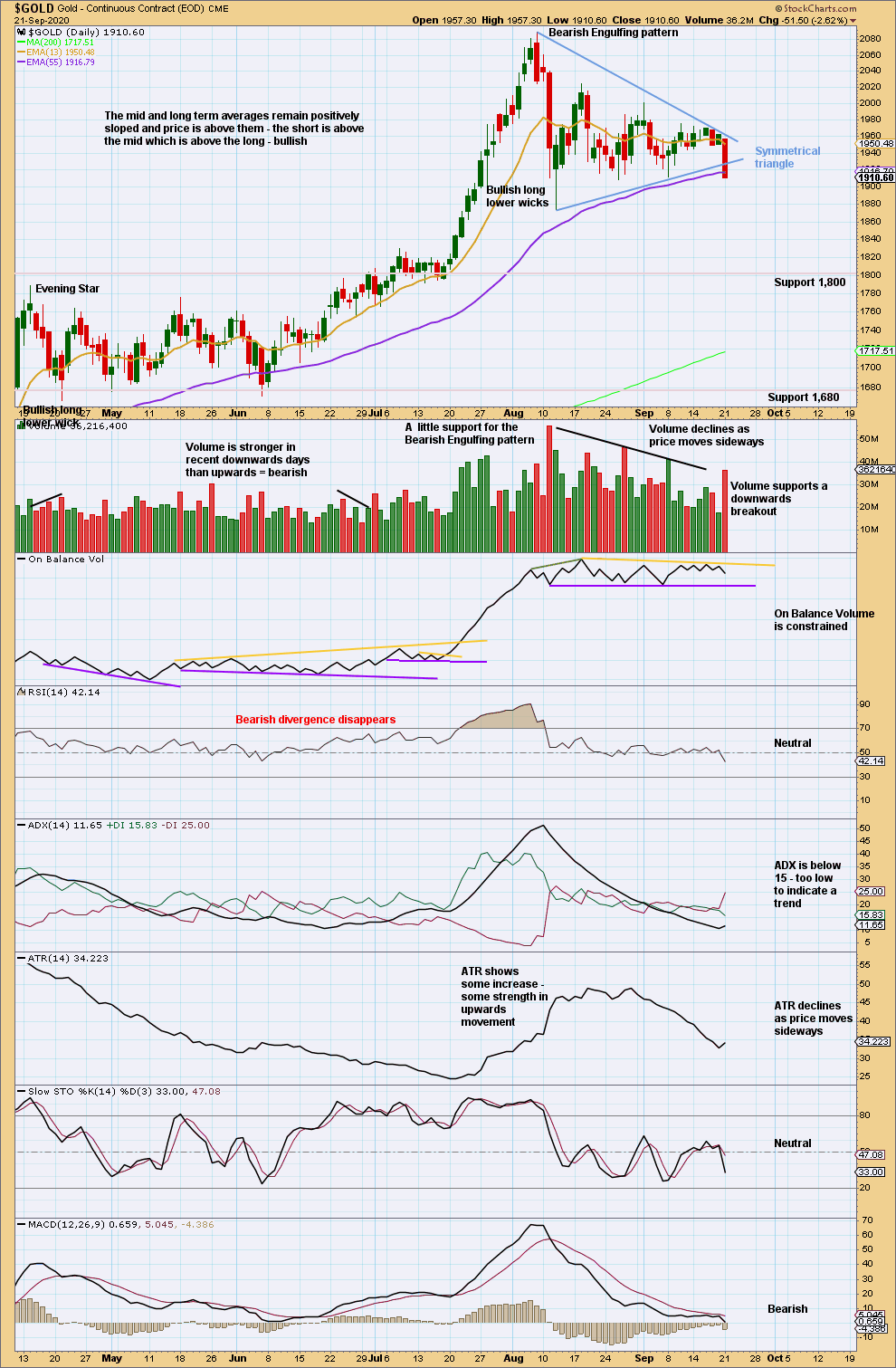
Click chart to enlarge. Chart courtesy of StockCharts.com.
Today there is a strong downwards breakout from the symmetrical triangle. A target calculated from the width of the base of the triangle is at 1,712.
From Kirkpatrick and Dhalquist regarding symmetrical triangles:
“Symmetrical triangles have many false breakouts and must be watched carefully…
Throwbacks… occur 37%… of the time, and, as in most patterns, when they occur, they detract from eventual performance. This implies that for actual investment or trading, the initial breakout should be acted upon, and if a pullback or throwback occurs, the protective stop should be tightened. It does not imply that a pullback or throwback should be ignored, but that instead, performance expectations should be less than if no pullback or throwback had occurred.
High volume on breakouts, both upward and downward, adds considerably to the performance of the formation and is something to look for. Overall performance is slightly below the mean for classic patterns.”
– Kirkpatrick, Charles D., II. Technical Analysis: The Complete Resource for Financial Market Technicians (p. 350). Pearson Education.
GDX WEEKLY CHART
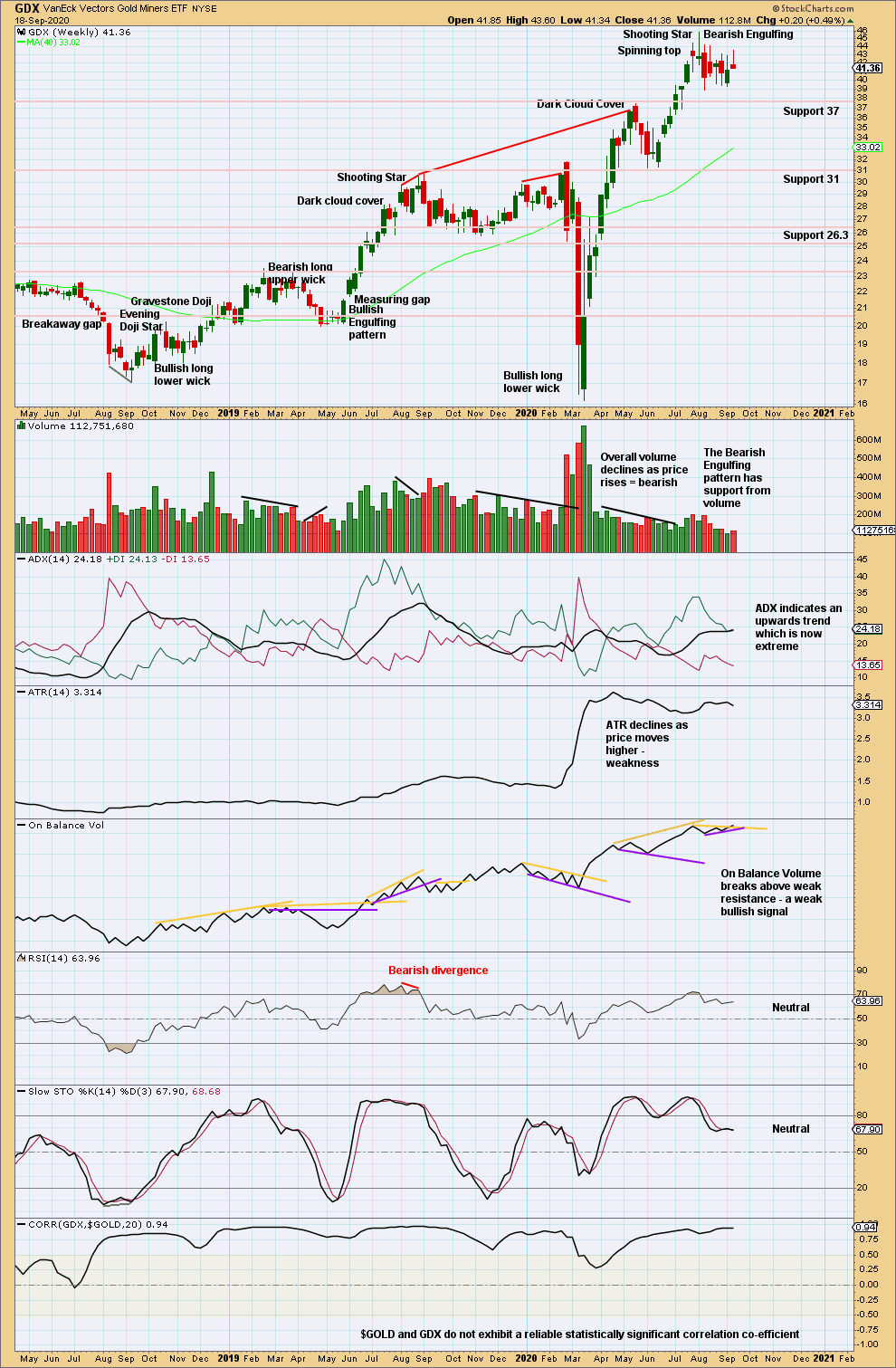
Click chart to enlarge. Chart courtesy of StockCharts.com.
Now two bearish candlestick reversal patterns in a Shooting Star and a Bearish Engulfing pattern indicate a trend change. With RSI reaching overbought at the high, these signals should be given weight. A trend change may be either a 180° change or a change to a sideways consolidation. So far it looks like a sideways consolidation may be forming. With volume declining as price moves sideways for the last 5 weeks, this so far looks like a possible consolidation within an ongoing upwards trend.
This week a weak bullish signal from On Balance Volume supports this view.
GDX DAILY CHART
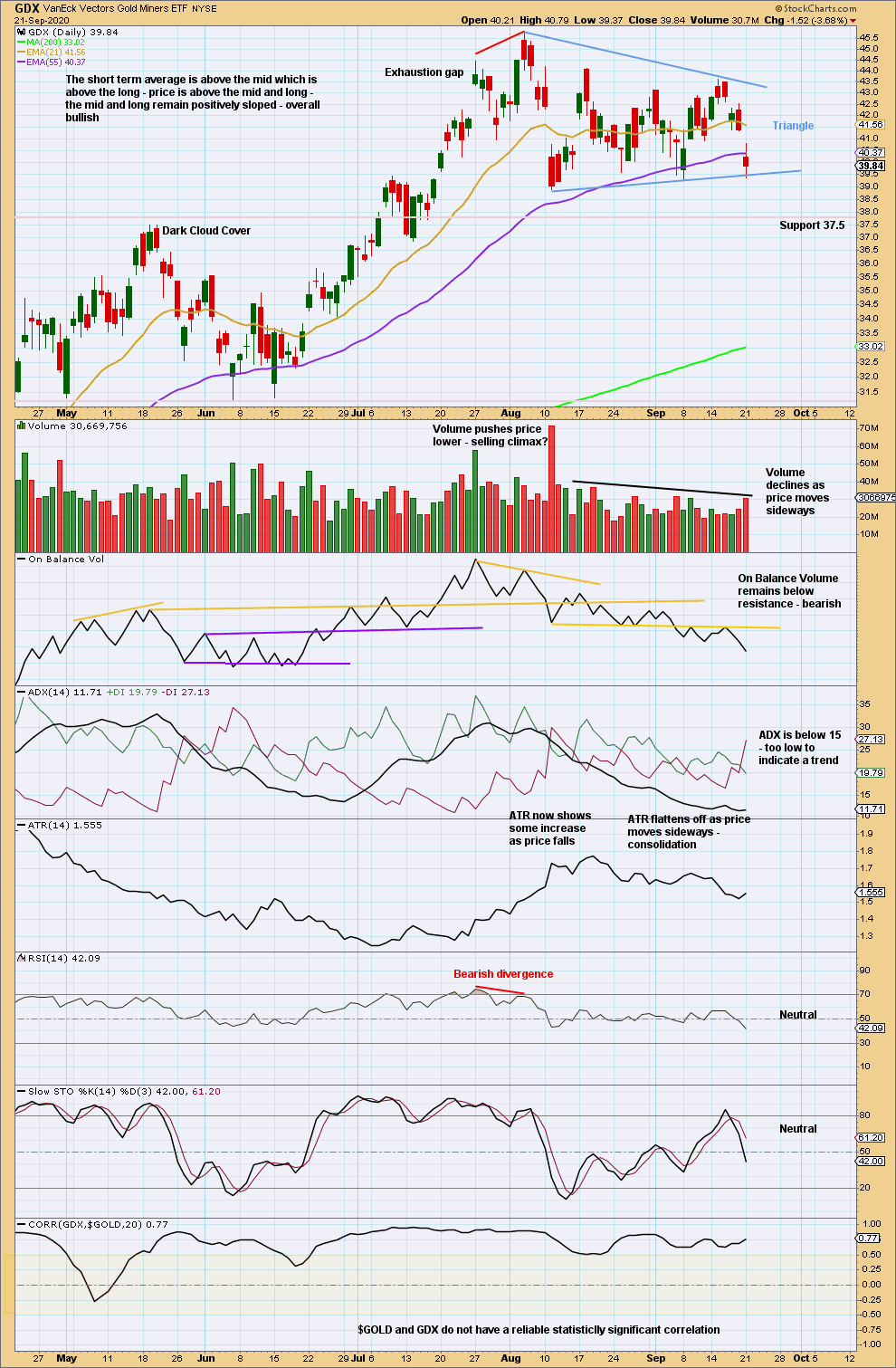
Click chart to enlarge. Chart courtesy of StockCharts.com.
For GDX there has been no breakout of price from the triangle. On Balance Volume still suggests a downwards breakout is most likely.
Published @ 07:58 p.m. ET.
—
Careful risk management protects your trading account(s).
Follow my two Golden Rules:
1. Always trade with stops.
2. Risk only 1-5% of equity on any one trade.
—
New updates to this analysis are in bold.

